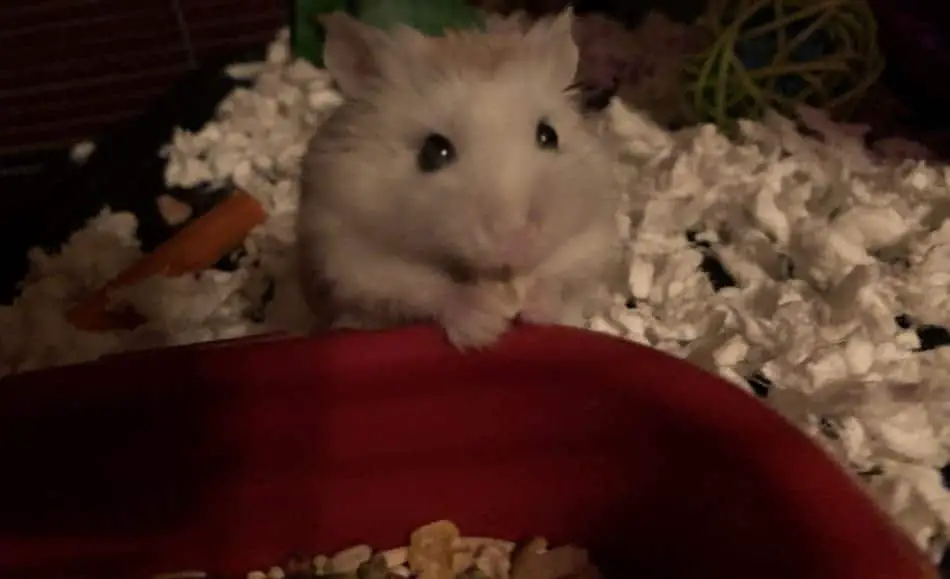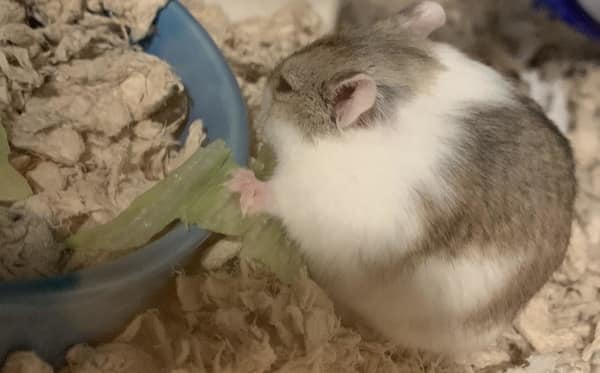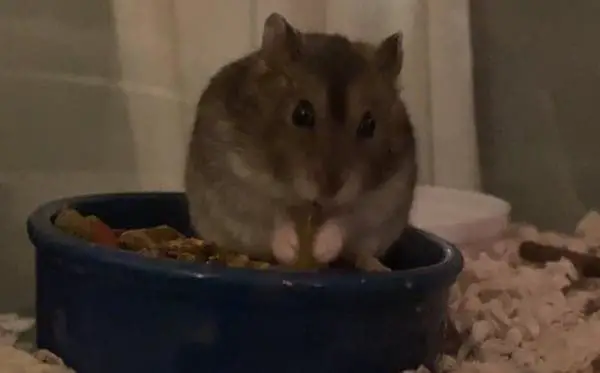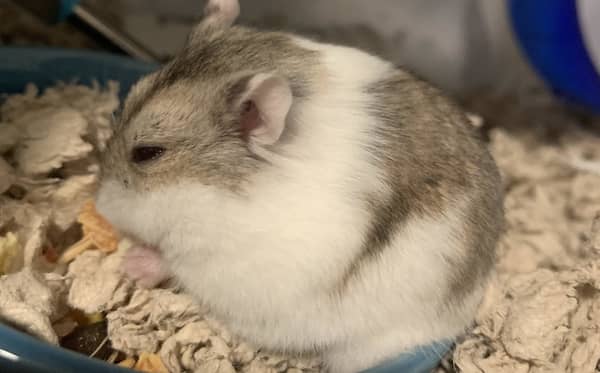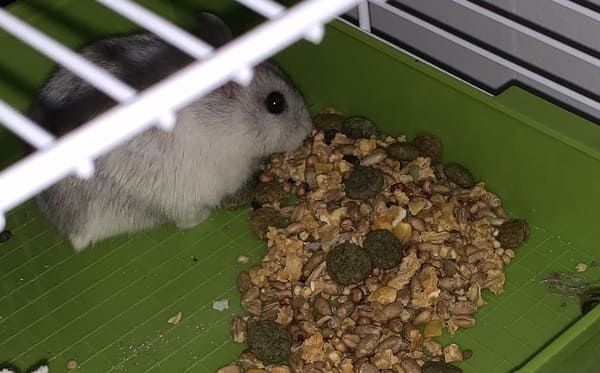Hamsters can make for quite the entertaining companions. They are little bundles of energy with big personalities that make us laugh as much as they confuse us when they do seemingly odd things like dig in their food bowl. Given the nature of the hamster, however, this behavior likely is nothing to fear.
So, why is my hamster digging in his food bowl? The most probable reason is because hamsters are natural burrowers and hoarders. There may be other things to look for, but this behavior likely is completely normal and healthy.
In this article we will examine the instinctual behavior that drives our domestic friends’ behaviors, the issue of boredom, how the type of food you are feeding could drive behavior, as well as possible nesting behaviors.
Burrowing and Hoarding Instincts
Domestic hamsters are not too far removed from their wild ancestors—in fact, the hamster was not tamed and brought into homes until the mid-1900s (as opposed to 20,000 to 40,000 years ago for dogs, and around 9,000 years ago for cats). This means that the wild instincts that drive our homebody hamsters are still about as strong as they are in their desert-dwelling cousins.
Hamsters are innate busy bodies who burrow and dig for most of their lives, usually living in series of tunnels and caves far underground to protect them from the harsh temperatures and predators of their given habitats.
This way of living has created an extremely strong urge to dig in hamsters, and that instinct did not miss the domestic hamster. If you have an avid digger, whether in its food bowl, nesting area, or its enclosure in general, it is highly likely that this behavior is normal, healthy, and should even be encouraged.
Often, digging is a sign of a busy hamster, which translates to a happy hamster. If you do not already have one, create an area with a box or a partition in your hamster’s enclosure specifically dedicated to digging to encourage your pal to constructively burn off energy and enjoy itself.
This may or may not decrease the amount of time your pal digs in its food bowl, but the behavior does not cause any harm so if it continues there is really no need to worry.
In addition to being instinctually driven to dig, hamsters are equally compelled to hoard. This is because in the wild, hamsters will roam large areas in search of food to shove in their big cheeks and bring back to their burrows for storage.
Wild hamsters often live near steppe-like and desert areas, or rocky areas where food scarcity can become an issue, especially in certain times of the year. Because of this, they hoard large amounts of food to get them through periods of scarcity.
If you are thinking your domestic hamster likely has this instinct as well, you are correct! If your hamster spends a lot of time digging into its food bowl, on top of its natural digging behavior, it is likely picking out pieces of food to take back to its secret stash.
Speaking of stash, the type of food you give your hamster may also have something to do with its behavior.
Type of Food
As discussed above, hamsters are avid hoarders and like us and many other animals, they have favorites when it comes to food. A wild hamster’s favorites vary depending on the breed and what is available in their habitat, but typically rich foods like nuts, seeds, and even insects likely top their favorites list.
You probably feed your hamster a mix of specialized pellets and a hamster mix containing different nuts, seeds, cracked corn, and dried vegetable pieces—not too far off from what your furry friend’s wild cousin prefers.
Sometimes your companion may start digging in a freshly topped-off food bowl for its favorite pieces of food, like sunflower seeds or pumpkin seeds, to take to its stash for later.
Often, hamsters will load up their big cheeks with their preferred foods to store and then eat later when no one is around. Hamsters often prefer to eat in solitude as they feel more secure that way.
Conversely, your hamster may encounter something in its food bowl that it finds offensive to its refined palate. If this is the case, it may attempt to dig the offending item out of the bowl. If you observe your hamster consistently digging out particular pieces of food while only ever hoarding or eating certain others, it might be creating an unbalanced diet for itself.
Monitor which pieces it avoids and which it overeats and try to strike a balance for your furry friend. You can do this by removing the favorite pieces and only giving them every other day or a few times a week, or by trying to give another kind of food with the same nutrients as the less-than-favorite pieces your pal has been avoiding.
In addition to a natural drive to dig or certain cravings your companion may have, another possible explanation for your hamster digging in its food bowl could be boredom.
Boredom and Restlessness
As previously discussed, hamsters are quite busy and have a great deal of energy. This is both because of their instinctual drive for digging, searching, and hoarding, and because of their high-energy diet.
The favorite foods discussed in the previous paragraph are just a few of the things that provide high amounts of carbohydrates to power our little pals for lots of running and digging. Both at home and in the wild, hamsters need to stay busy to eat and live happy and healthy lives.
Boredom in hamsters can often turn into stress which manifests in unhealthy ways such as obsessive running, bar biting, and more. If you notice your pocket-sized pal is compulsively digging in its bowl and does not have many other outlets for its energy, you may consider enriching its environment.
Fortunately, there are plenty of ways to enrich your companion’s habitat to make sure it has lots of outlets for all that energy. Placing a properly-sized wheel in your hamster’s enclosure is a great start—domestic hamsters are thought to be able to run approximately five and a half miles in one night!
Additionally, adding different houses, hides, and pipes or tubes in which your hamster can run and store food will help ensure your furry friend is always occupied.
If you do not already have one, consider getting an enclosure for your pal that has multiple levels and make sure there are always lots of chew blocks and toys for it to use. Finally, as mentioned previously, give your hamster a dedicated place to dig to help get all that stored-up energy out and to encourage its natural drive to do so.
If your furry friend has recently started exhibiting this behavior and you do not suspect that boredom, stress, or the craving for a favorite (or desire to get rid of a least favorite) food is the reason, your hamster may be expecting a few tiny bundles of joy.
Nesting and Pregnancy
Like most other small mammals and rodents, nesting (to an extent) is common with hamsters. Often, your pal will take bedding materials you put in its cage and spread them around or push them into a favorite corner or hide, which is completely normal. However, sometimes nesting behavior can be one of the earlier signs of pregnancy in hamsters.
If your friend has been spending an uncharacteristic amount of time digging in its food bowl and storing food, be on the lookout for some of these other signs of pregnancy, even if you think your pal is male (rodents and small mammals are often incorrectly sexed in pet stores and housed together):
- Uncharacteristic nesting (taking large amounts of bedding material to one area)
- Uncharacteristic hoarding (chiefly beneath the new nest area)
- Increased appetite and weight
- Increased drinking
- Uncharacteristic aggression or reluctance to being handled
- Nipples protruding from abdomen
If you have noticed any of these symptoms in your hamster accompanying new digging behavior, you might be expecting babies soon. If this is the case, you will want to have your furry expecting friend examined by a veterinarian right away.
Hamsters only gestate for a period of between 16 and 30 days, depending on the breed, so time is of the essence if you suspect pregnancy. You will also need to make some adjustments to your friend’s diet, namely in protein content, to ensure the mother and babies are all healthy.
Fortunately, there are plenty of resources available to help you through the process of pregnancy and having baby hamsters on your hands, including your veterinarian, so if your hamster is happy and healthy there should be no need for extra stress or concern. Keep your hamster comfortable and fed and you will have a happy family in your home in no time.
Conclusion
If your healthy, pocket-sized pal has been digging in its food bowl lately there likely is no cause for concern—it is simply doing what hamsters do best! Hamsters are natural busy bodies and have lots of energy to burn, so digging and hoarding behaviors are healthy and should be encouraged.
Your furry friend might simply have a refined palette and is picking out its favorite pieces of food or getting rid of the ones it does not like. This behavior is also fine provided you are ensuring your hamster gets a balanced diet. Your companion may be feeling bored or restless due to all that energy, so be sure to provide plenty of stimulation in the form of physical exercise and toys.
Finally, your hamster could be showing signs of pregnancy, so watch out for other cues and schedule a veterinarian visit if necessary. Watching your hamster dig through its food bowl might be puzzling to you, but it most likely is completely normal behavior, so sit back and enjoy all the antics of your furry friend in peace.

